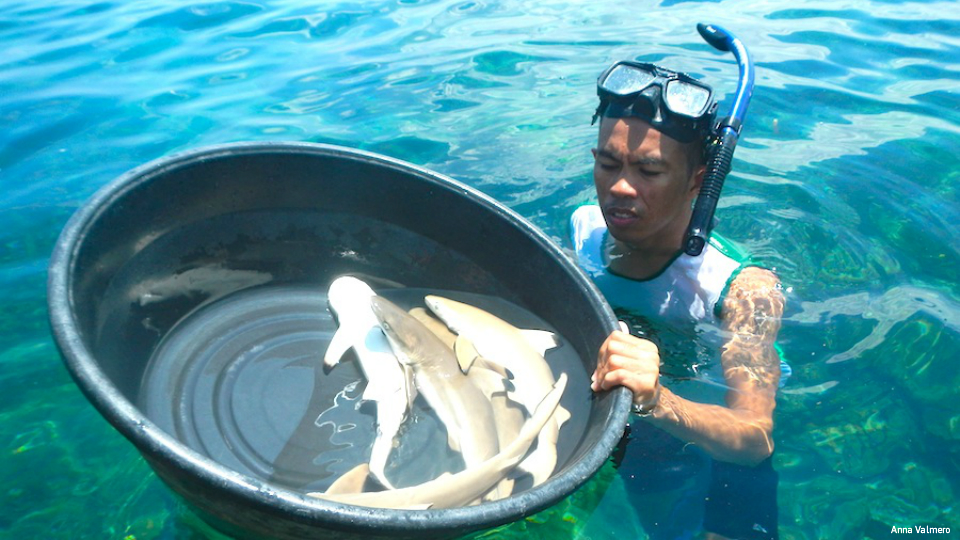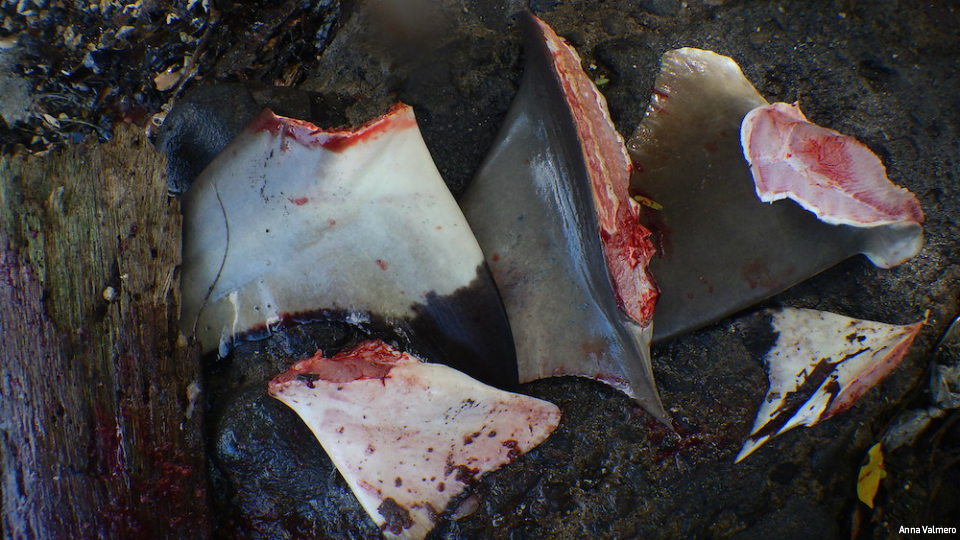Filtered By: Scitech
SciTech
Fighting for sharks in the Philippines
By ANNA VALMERO

CALATAGAN, BATANGAS — His skin burnt from from years of diving, a local reef warden gets ready for another underwater guard watch with his usual attire: fins, snorkel and a mask. It’s just another day in the office as he readies to release five premature blacktip reef sharks (Carcharhinus melanopterus) into a nearby shallow reef that already show slight signs of bleaching.
The baby sharks swam out to the coastal village’s wharf just as a local fishermen, Mariano Bautista, slit open the belly of their mother, a 1.2-meter-long blacktip reef shark, caught one Sunday morning off the coast of Batangas.
This story is told too often in different parts of the world. The bycatching of reef sharks—sometimes accidental, but more often intentional—is a serious issue highlighting mankind’s harsh impact on marine resources.
Each year, up to 100 million sharks are killed for their fins, according to the latest report by the Global Ocean Commission.
The issue of bycatch is one of the many challenges that threaten the oceans, upsetting the balance of marine ecosystems.
But the story doesn't end here.
Non-stop demand from oceans
The oceans are also threatened by a mix of challenges including overfishing, massive biodiversity loss, ineffective management and enforcement of ocean protection, and deficiencies in high seas governance, according to the latest landmark report by the Global Ocean Commission.
Just before the premature reef sharks could swim any further out in the open, Delos Reyes' brother, Alex, collected the babies so they can be released in a protected reef. This gives them a better chance at survival to adulthood so that they can, eventually, contribute to maintaining a healthy and productive reef.
“This is very sad. As much as we tell them to not catch sharks or rays, they rely only on fishing, mostly for subsistence. For them, any catch will mean food on the table. But we are hopeful that the baby sharks we released today will be able to survive back in their natural home and that this serves as a lesson to local fishermen,” noted Delos Reyes, who also served as trainer at Conserve and Protect Oceans (CAPOceans) Foundation, a local foundation that promotes ocean conservation.
Blacktip reef sharks, according to Filipino marine biologist Dr. A. A. Yaptinchay, are apex predators that help keep fish populations healthy, especially when decades of overfishing has depleted 87 percent of global fish stocks.
“Reef sharks help in controlling sick, diseased, and genetically inferior individuals to maintain robust fish stocks. They also feed on midlevel carnivores to ensure that herbivore fishes can do their job to help coral reefs grow better by eating algae,” noted Yaptinchay.
If there is too much algal growth in the ocean, it can severely stress and upset coral reef systems, that serve as nurseries for small fishes. Without coral reefs to protect them, the small fishes can easily fall prey to predators and die long before they mature and produce their own offspring.
Tough choices
When faced with a choice of keeping the ocean healthy and keeping one’s ability to bring food to the family, sadly, most fisherfolk would go for the latter.
Bautista said that he sold the freshly-cut fins for P200 (about $5) per kilo, the same price as a kilo of tanigue mackerel. Meanwhile, the reef shark’s meat was sold at P20 (about $0.50) per kilo.


A kilo of dried shark’s fin—a local delicacy served in Chinese restaurants—sells for P7,000 (approximately $160), said Delos Reyes when he made rounds in Divisoria, a popular bargain’s market in Manila.
The blacktip reef shark is listed as a near-threatened species under the IUCN Red List, referring to global populations “not in immediate danger of depletion.”
“While they may still be common, it does not mean that they are not threatened,” said Yaptinchay.
Lobbying for protection of marine animals is slowly taking progress after the Philippines recently passed a bill that bans the catching of sharks and rays, while some local airline carriers such as Cebu Pacific prohibited shark fin carriage to help discourage the trade.
And more needs to be done.
Glimmer of hope
The second week of August, 2014, the first Philippine Shark Summit is to be held in Cebu to discuss measures for encouraging protection of these animals and their long-term benefits for the community in the form of sustainable fish and alternative livelihood, such as ecotourism.
In the Philippines, Malapascua has been generating income from shark tourism as divers flock the area to see their underwater treasures while Donsol and Cebu are getting attention as whale shark eco tours. — TJD, GMA News
More Videos
Most Popular



